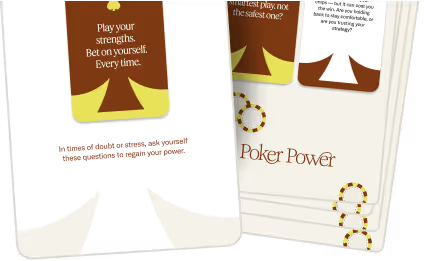Making smart financial decisions starts with fast decision-making skills
Have you ever experienced buyer’s remorse? Or what about investors’ FOMO?
Let’s get real. Smart financial decisions, whether they're big or small, are driving factors for many of us. If you don’t feel like a powerhouse accountant, you’re not alone. Most women don’t ask for help because they feel uncomfortable discussing finances.
“We don’t ask for help because we don’t want to be a burden," explains Claire Wasserman, author and founder of Ladies Get Paid. "We don’t want to admit what we don’t know.”
But a willingness to ask questions makes all the difference. Couple that with a set of sure-fire skills, and you’ll be kissing FOMO goodbye.
Money management, in its most rudimentary form, is a lot like poker. You have to weigh your risks, your rewards, and the potential consequences that can result when you bet too much. A good poker player is well-versed in proper money management. When you’re playing a hand of cards, you can gauge whether you should hold off until you get more information or wage a bigger bet. Knowing when to save or pay up is important when you’re shopping around for larger items.
The art of negotiation
Many financial decisions involve some sort of negotiation. When buying a home, an automobile, or property, negotiations are essential to getting the most for your money and ensuring the purchase has the value you desire.
Poker players quickly learn the art of negotiation because of the interactive nature of any poker game. While all decisions are solo ones, they must use all of the actions at the table to make the best choices. A strong player knows how to use odds-based calculations to persuade other players to make moves that benefit themselves. If you’re going in on a bluff, and wage a high enough pot with confidence while the other plays have been slow to bet, you might be able to assume they are playing safely because of weak hands. You could be successful just on that read alone.
Negotiation skills come into play in many business situations as well. It only makes sense that a person applying for a job or discussing a promotion will have done the proper research going into the meeting. This allows the person to better negotiate pay rates and other benefits like vacation time, parental leave, and healthcare coverage. When you approach these situations with thoughtful research and develop planned responses, you’re much more likely to garner a favorable outcome.
Well-timed aggression
Aggression is not often associated with smart financial decisions. Most advisers discourage aggression and quick decision-making and instead advocate for slowing down the process, taking more time, and not rushing into major decisions.
In poker, aggression can be a good quality in a player, but not when used wantonly or purely for effect. Female poker instructors, like the ones at Poker Power, often refer to well-timed aggression. This involves learning how to use the positions at the table and one’s own financial value to be effectively aggressive. Some examples are:
- A person with the most chips at the table bets aggressively from the button, or dealer, position.
- A player with a short stack of chips wants to bet and raise more timid opponents to push them into making hard decisions.
- If opponents at a table are calling most bets, it's time to be more aggressive and raise or re-raise more often. This forces those opponents to fold weaker hands and commit to stronger ones. It gives the aggressor power.
Aggression isn’t a four-letter word. Applying pressure, being confident when offering a deal, and making an educated, quick decision are all elements of aggression. When it’s broken down that way, it sounds kind of … nice. If several people are vying to be promoted to an open position, the most aggressive one might garner the most attention and stand out from the crowd. When negotiating for a home that has many bids, an aggressive proposal might get it done.
Quick decision-making skills
Rare financial opportunities often require us to make quick decisions. Taking too much time can mean that a good deal or rare business prospect could slip through our fingers.
Poker players learn they can take a certain amount of time for many decisions. But quick decision-making often shows confidence and lets opponents know the person is assertive and assured of the outcome they want.
Quick decision-making skills are underutilized and often left out of traditional business classes and seminars because they require preparation and practice. And, as women can attest, they often require strong intuition.
Every situation is different, but by doing research, using financial knowledge, and basing decisions on experience, a person can often make quick financial moves – with aggression if necessary – to ensure the desired outcome.
Don't overthink things. Be educated and confident in your financial decisions. And use the power of poker to learn how to do that the most effectively. Poker Power offers those opportunities through free poker lessons, in private and individualized poker lessons, or via corporate workshops.





